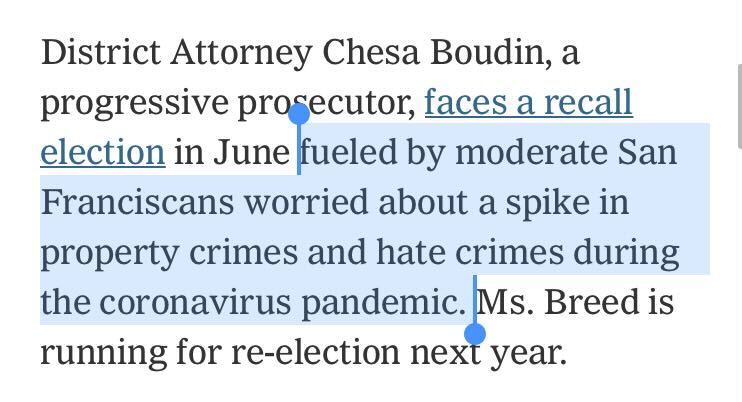
Thread. Earlier today, the New York Times published multiple factual claims that are untrue. What happened is part of a pattern at NYT. I try to document it below in as much detail as I can.
Today's article was ostensibly about a school board recall in San Francisco. As it has done so many times, however, the NYT let its San Francisco "Bureau Chief" Thomas Fuller insert a gratuitous paragraph about crime. nytimes.com/2022/02/16/us/… 

Note first that Fuller is same NYT "bureau chief" caught last year fabricating a "shoplifting epidemic" and then engaging in the equivalent of climate science denial by suggesting a reason for the (nonexistent) epidemic was mild sentencing reform.
https://twitter.com/equalityAlec/status/1396653798605660165
There has apparently been no consequences or accountability at NYT for a prominent bureau chief making up a claim, using breathless urgent words to describe the false claim with urgency, and then suggesting a devastating policy outcome with no evidence.
https://twitter.com/equalityAlec/status/1396653800052641796
Now to today's claims. Note Fuller's first claim: The recall of Boudin is "fueled by moderate San Franciscans." This is false. By far the largest donor is a Republican billionaire. The big donors are right-wing hedge fund, venture capital, etc. sfexaminer.com/findings/the-r…
Why does this matter? In a liberal city, it's vital for recall (pushed by far-right police union and billionaire Republicans) to not be seen as conservative. Unlike other local journalists, Fuller does the dirty work for them: he tells millions of readers it is "moderate" people.
Also note that adding the word "moderate" was completely gratuitous. The New York Times didn't need to characterize the politics of the people pushing the recall. The NYT seems to have made an editorial choice to do that to make it seem more reasonable to liberal readers.
Note Fuller's second claim: "a spike in property crimes." This is just false. If you look at the actual data, property crime was actually down a modest 11.2% in San Francisco from 2019 (before pandemic) to 2021. mercurynews.com/2022/01/03/ami… 

Now there was a modest increase in 2021 from 2020, which makes sense because people were locked down for a large amount of 2020. But Fuller actively hides the truth: property crime is lower in SF than before the pandemic!
Fuller also asserts as genuine the recall's stated concerns about property/hate crime but leaves out many of their actual goals: real estate development, targeting of homeless, increased surveillance, return of cash bail, police and prison guard union profiteering, etc...
By asserting as genuine the stated concerns of self-interested actors, Fuller engages in a common NYT propaganda tactic: providing cover for corporate and right-wing interests who are not acting in good faith. There was no need--Fuller could have caveated their "stated" goals.
(One sidenote about hate crimes. 31 of the 60 hate crime incidents in SF in 2021 were a single defendant targeting Asian businesses. The SF police infamously arrested the wrong person, and Boudin is now prosecuting the person.)
I know one paragraph in a larger story doesn't seem like a big deal. But I've documented numerous examples of false information and corporate/pro-police misinformation recently in the New York Times. Read this collection of threads--it's astonishing.
https://twitter.com/equalityAlec/status/1483528171374972931
At a time of rising fascism, ecological collapse, lack of health care/housing, and extreme inequality, what the news covers and how it covers those issues significantly shapes how we see the world and what we think is urgent and true.
https://twitter.com/equalityAlec/status/1464270507310727171
• • •
Missing some Tweet in this thread? You can try to
force a refresh




